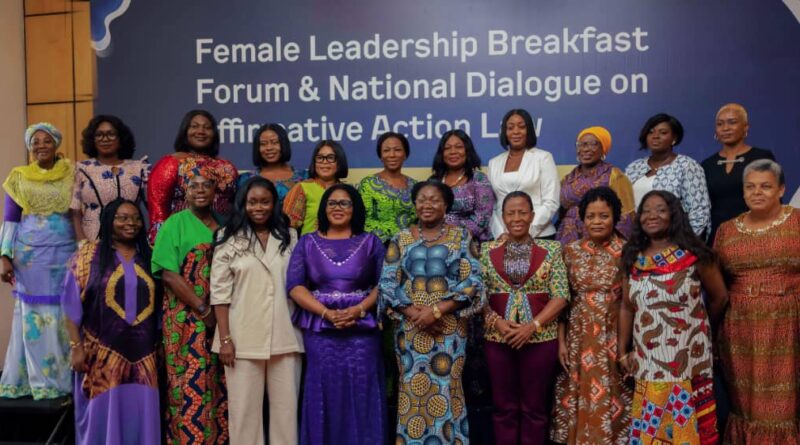Claudia Kwarteng-lumor Hosts Female MPs, Foreign Ambassadors And policy influencers….
The Marriott Hotel in Accra became a hub for critical discussions on advancing female leadership in Ghana as Claudia Kwarteng Lumor, founder of Glitz Africa Magazine, convened the 2025 Women’s Leadership Breakfast Forum.
This National Dialogue on Affirmative Action, held on March 28, 2025, brought together prominent policymakers, female leaders, and international figures to address the challenges and opportunities surrounding the Affirmative Action Law, recently passed in Ghana.
At the heart of the summit was the powerful recognition that although the Affirmative Action Law has now been enacted, true change lies in its successful implementation.
Claudia Kwarteng Lumor, as convener, in her opening remarks, emphasized that while Ghana has made impressive strides with the law, women’s representation in leadership positions must go beyond just numerical targets.
“How do we ensure that women are not just present in leadership spaces but are also empowered to drive transformative change?” she asked, urging attendees to think beyond policy into concrete actions that would bring the law to life.
Her reflections were framed within Ghana’s ambitious gender equity targets: 30% representation of women in decision-making by 2026, 35% by 2028, and 50% by 2030.
Despite these clear objectives, Claudia Kwarteng Lumor highlighted the persistent hurdles to gender parity, such as institutional resistance, cultural biases, and inadequate enforcement mechanisms.
“We must ensure that the institutions meant to support gender equality are adequately resourced,” she emphasized, calling for stronger governmental and institutional support for the Ministry of Gender, Children, and Social Protection.
Former Minister for Gender, Children, and Social Protection, and current Deputy Chief of Staff, Nana Oye Bampoe, who was instrumental in the drafting and promotion of the Affirmative Action Bill, shared the historical journey of the bill’s passage.
Nana Oye Bampoe recalled how in 1996, Gloria Ofori Boadu first proposed the idea of affirmative action in Ghana, sparking a movement that would take decades to materialize.
“Thirty-three years later, we now have an act, and it’s a moment for celebration,” she remarked.
Reflecting on the persistence required to push the bill through, she drew attention to the challenges women face globally, citing examples from Nigeria, where female politicians like Senator Natasha Akoti have faced significant resistance and even suspension for speaking out on issues like sexual harassment.
Nana Oye Bampoe was candid about the broader challenges women face, acknowledging that even with the law in place, entrenched societal norms such as patriarchy and gender stereotypes continue to obstruct progress.
The current Minister for Gender, Children, and Social Protection, Dr. Agnes Naa Momo Lartey, also underscored the government’s ongoing commitment to the successful implementation of the Affirmative Action Act.
“Fifty years ago, Ghana took its first steps toward integrating women into national development,” she said, citing the establishment of the National Council on Women and Development in 1975. Dr. Lartey proudly noted that Ghana had made significant progress, with women now holding prominent roles in politics, business, and other sectors.
“For the first time in Ghana’s political history, we have a female vice president, and that is something worth celebrating,” she stated.
However, she stressed that this progress is not automatic. Dr. Lartey pointed to the critical need for structures like the Gender Equity Committee, which will monitor the law’s implementation and ensure compliance across ministries, departments, and agencies.
“We are finalizing the legislative instrument to guide the enforcement of this law,” she said, promising a continued focus on public education to foster a culture of respect for gender equity.
A common thread throughout the summit was the recognition that while Ghana’s legislative landscape is evolving, the real challenge lies in translating laws into tangible outcomes.
Claudia Kwarteng Lumor framed this ongoing challenge with optimism, stating that the summit was a moment for all stakeholders—policymakers, civil society, and the public—to come together with actionable plans.
The forum served as a space to forge new alliances, and several notable international representatives, including Harriet Thompson, the British High Commissioner to Ghana, and H.E. Simone Giger, the Swiss Ambassador, lent their support to the cause.
As the summit concluded, Claudia Kwarteng-Lumor urged all attendees to move forward with a clear sense of purpose, encouraging them to continue advocating for gender equity, not just in Ghana but globally.
“This dialogue must lead to action,” she stressed. “Together, we can build a Ghana where leadership reflects the true diversity of its people, and where women are empowered to lead at all levels.”
The summit was a powerful reminder that while laws are crucial, it is the collective will of society—policy influencers, activists, and government officials—that will drive lasting change for women in Ghana’s leadership spaces.
-BY Daniel Bampoe

